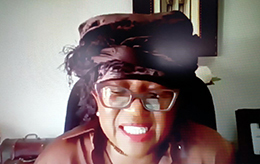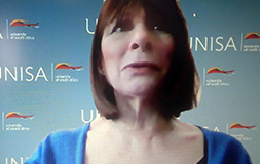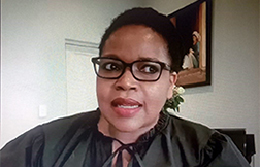
Internal and external experts joined Unisa, as it held a Recognition of Prior Learning (RPL) webinar on 17 November 2021, to showcase and recognise the impact of the RPL programme. The programme is part of the university’s commitment to being responsive and student-centred through the provision of a supportive and enabling environment for students.
Other than insightful presentations, the event showcased videos profiling students who were admitted into the university’s qualifications through the RPL process. The videos were presented in all South Africa's official languages, Sign Language and subtitles.

Tebogo Baloyi
As she opened and welcomed everybody to the webinar, Unisa’s Nelisa Tshaka, Acting Director: Directorate Instructional Support and Services, said that the videos were presented in all these languages in response to the discourse of curriculum transformation, decolonisation, Africanisation and ubuntu. "By documenting our students’ views, we are contributing towards an engaged scholarship."
Poet, Tebogo Baloyi, delivered a poem praising Unisa for its incorporation of African languages in their curriculum, and acknowledging the RPL process and its benefits to students. Unisa’s Dr Mutambuli Hadji, RPL Specialist: Directorate Instructional Support and Services, shared the making of the RPL project, and appreciated all stakeholders that contributed to the project.
Representing the College of Human Sciences, Prof Stanley Madonsela, Chair of the Department of African Languages, spoke on bringing humanity through the vernacular. "In bringing humanity into our space, we are motivated by the mission of the college of being a responsive and people-centred community of learning. In advancing the mission of the college and that of the university, we are guided by academic integrity, quality, and good practice to ensure the need for human dignity, trust, fairness and responsibility."
Speaking on embracing indigenous languages theoretically and practically, Prof Koliswa Moropa, Project Leader for Unisa’s Language Unit remarked: "In higher education, the previously marginalised African languages have not been afforded the space to function as academic and scientific languages, or languages for official communication." She continued: "Higher education institutions should nurture an environment where multilingualism is not seen as a problem, but as a resource to facilitate, among others, epistemic access, transformation, social cohesion and respect for all languages." Moropa dismissed the myth that some languages are intrinsically superior to others.

Prof Veronica McKay
The keynote speaker, Unisa’s Prof Veronica McKay, Acting Vice-Principal: Teaching, Learning, Community Engagement and Student Support, focused on RPL in support of the vice-chancellor’s vision of reclaiming Africa’s intellectual futures. McKay shared the history, extent of, and achievement by RPL, and highlighted how students benefit from the programme. She explained: "We provide students with study opportunities for the recognition of previous knowledge, skills and competencies that people have gained through informal and formal learning, in order for them to have access, mobility and better career paths."
The RPL programme also considers indigenous knowledge systems and motivates people to strengthen their learning abilities. "It integrates non-formal and informal learning with formal learning," and she continued, "the process of what happens before, during, and after the application is very important".

Florence Masebe
Multilingual media personality and language activist, Florence Masebe, shared how important it is for her to express herself in her language and other people’s indigenous languages, as the marginalisation of these languages still exists. Sharing her experience, she also reflected on how in the performing arts, performers were judged not necessarily by their ability, but how well they could speak the English language. She added: "During the rainbow transition, we fell in love with black people who spoke English well, and all the amazing black talents from in-front and behind the scenes disappeared and were unemployed." She expressed how problematic that was as performers did not give much thought to how African languages were articulated.
"Over the years, it meant performers became responsible for killing the essence of African languages as they did not have to be true to them," she added. Masebe encouraged performers that while they get their qualifications in performing arts, they need to demonstrate that they can tell African stories authentically.
Prof Thomas Sengani, a retired professor from Unisa’s Department of African Languages, stated that African languages are tools to extract information from different cultures, heritage, histories and the environment. He added: "It is important to understand the meanings and messages behind our African names." Referring to some words in different indigenous languages, he asserted that in order to enjoy these languages, comparison studies must be done contextually.
Madonsela reiterated the importance of viewing African languages from a national idea of social cohesion and promoting the spirit of African philosophy, which can be better achieved by breaking language barriers. "As the African Languages department, we need to adopt measures that will ensure the progressive realisation of human rights, that includes the right to language and culture. Language is, therefore, a vehicle to expose culture."
Moropa reflected on the progress made by Unisa in the implementation of the language policy as far back as 2010. She remarked: "Since the implementation of the current language policy, academic departments have started teaching some modules in more than one language." She also touched on the discussion forum on myUnisa which is offered in various African languages. Moropa commended Unisa for the effort and buy-in in using indigenous language in teaching, learning, and research.
In closing, Unisa’s Dr Mpho Rakwena Monareng, Director: Language Services, thanked everyone and the speakers for their insightful presentations, and encouraged them to continue producing knowledge.
* By Nancy Legodi, Acting Journalist, Department of Institutional Advancement
Publish date: 2021-11-23 00:00:00.0